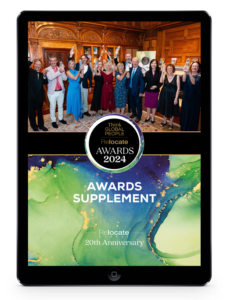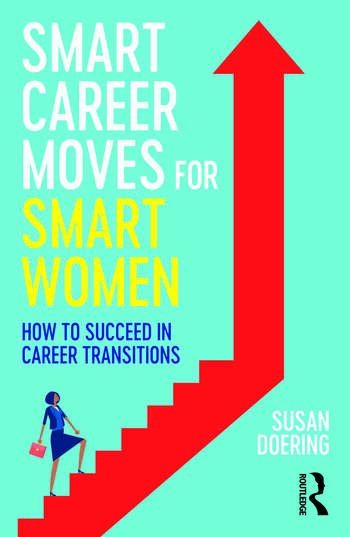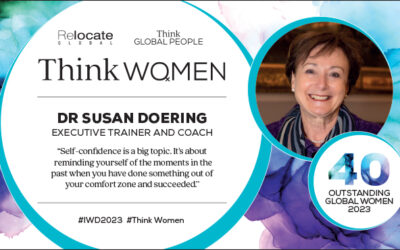Eight ways to make a successful career transition for women
and a new book by leadership coach Dr Susan Doering
provides a handy guide to a successful transition,
Sally Robinson reports.
Susan Doering has plenty of experience in career change:
she started as a lecturer at Vienna University, transitioned into global events and then pivoted to become a global career and leadership coach. Her experience is increasingly common:
recent LinkedIn data shows that job transitions for women are up 54% year on year while Deloitte’s 2023 Women@Work survey (which spoke to 5,000 women globally) found more respondents had left their job in the last year than in 2020 and 2021 combined, with a lack of flexibility cited as the main reason. It all adds up to a female workforce looking for change. Enter Susan Doering, a multi-lingual career and leadership coach, whose new book, ‘Smart Career Moves for Smart Women’, is full of practical information on changing direction. The most important thing she has learned along the way? “Decide what you want to do, make it something that really aligns with your values, and do not be dissuaded,” she says. Here are her top tips to get started.
1.WORK OUT YOUR OWN VALUES
It sounds simple, but women often don’t take time to think about what they want or need from their career.
“Even in 2023 women are still bearing the double load of caring for others and paid work,” says Doering. “Knowing yourself and your values system is the foundation for everything.”
Women often take the path of least resistance and fall into a career without stopping to consider if it is what they really want to do. “It is important to stop and reflect. What works for us at 22 might not work at 40 because we change as we learn about ourselves and the world.”
Doering suggests starting with exploring the things that are important to you in life, not just at work. This could be the environment, or it could be education. “Writing it down is really helpful. If people are more visual they might prefer to create a mood board on Pinterest.”
Doering also suggests ranking the values for the role of work in your life, which might include professional status, financial gain, stability, serving the community, time for family and friends, independence, adventure and work-life balance. Then ask yourself if you are living and working in a way which honours these values.
“Women are usually clear on their technical skills, but it is also important to think about your
transferable skills – things like negotiating, communicating and
strategic planning.” It’s not easy to identify our own strengths so Doering suggests asking five or six friends and colleagues what they see as your strengths. “The results can often be surprising,” says Doering. As AI impacts the workforce, skills
such as applied judgment, creativity, critical thinking and leadership will be in greater demand to ensure technology is used effectively.
2. DEVELOP A GROWTH MINDSET
Having a growth mindset means being prepared to learn: “Put it at the top of your list,” says Doering. This also extends to learning how to do things better and learning from our mistakes. ‘Never say you can’t do something without adding… yet.”
A growth mindset is often developed as we grow up. “We notice in our parents, or the people around us, that they are open to new things, and they encourage us to be open and interested too. It can be helpful to realise there is another way of looking at things, which can help women realise there are choices available to them. “As women get older they think certain things are not for them, which isnonsense,” says Doering.
3. CONSIDER ENTREPRENEURSHIP
According to the 2022 Global Entrepreneurship Monitor, women account for two out of every five early-stage entrepreneurs globally and one in three high-growth entrepreneurs. In the UK, female founders built more new businesses last year than ever before, according to NatWest’s
recent Rose Review, despite a challenging economic environment. The report found women in the UK launched over 15,000 new companies in 2022 – more than twice as many as in 2018 and estimates £250 billion of new value could be added to the UK economy if women started and scaled new businesses at the same rate as men.
“Post Covid, the idea of entrepreneurship has become very powerful for women” says Doering, but she cautions it is not
for everybody and it is vital to do the groundwork. “To succeed, you need to be determined, exceedingly resilient and prepared to work harder than you ever have. It is a mindset.”
Doering also cautions the importance of facing your own
weaknesses. “If figures are not your forte, for example, you need to ask yourself how you can counter this. “The biggest mistake people make setting up on their own is thinking
they can do it all alone.” Doering suggests proceeding with baby steps and taking it slowly and keeping some sort of safety net while you get started and her book provides a useful checklist to work out if entrepreneurship is the right move. “It is a very particular type of person who wants to be out there alone.”
4. BOOST YOUR SELF CONFIDENCE
One of the biggest obstacles to making a career change for women is a lack of self-confidence. “It comes up all the time,” says Doering. In her coaching sessions she asks her clients to provide a list of their achievements, both professional and personal. “Really think about the times you did something well– it could be something small or simple like winning a swimming award at school, or organising a school fete. Time and time again women tell me they don’t have any achievements, but we dig and dig until they are uncovered. It can be very empowering.”
5. CREATE A MAP OF OPPORTUNITIES
Once women have decided to make a career transition it can be hard to work out where to start. Doering suggests drawing up a systematic map of opportunities, which is part brainstorming with yourself and part detailed research. She suggests creating a list of items including: your ideal role;
the area of industry (for example healthcare, finance, education etc); the size of the organisation (small or large) and the location. Next, create a list of the organisations operating in your wish-list field. The idea, she says, is to narrow it down through filters and funnels and then start reaching out to people in those organisations.
“We do a lot of our research online, but you also need to talk to as many people as you can. LinkedIn is very helpful here. Get in touch saying you find their organisation really interesting, explain what you are doing, and suggest a virtual coffee. Nine out of ten people say yes and are extremely
6. DON’T BE AFRAID TO ASK FOR SUPPORT
Doering has learnt from her coaching practice that women
seek support more than men because they realise they can’t do everything on their own. Doering believes it is impossible to transition without a support network that can fulfil a variety of roles and could include colleagues, peer groups, uni alumni, family and friends and other contacts. “These people can play various roles from opening doors to providing information, creating leads and mentoring,” says Doering. “You are not necessarily asking anyone for a job, but gathering information.”
Doering is also a fan of more formal mentors, which could be
somebody in the same organisation, or in a related industry, or it could be through a career network such as the British Association of Female Entrepreneurs or Women in Tech.
7. BE A GOOD COMMUNICATOR
Psychometric tests can evaluate your personality, but Doering suggests we can usually work it out for ourselves. The golden rules are to manage your own emotions, really listen to colleagues and show interest in them, demonstrate respect for their knowledge and expertise, and always credit them for work they have done.
8. BELIEVE IN YOURSELF
Being yourself and believing in who you are is essential in any career journey. Doering suggests writing a list of every key achievement in your life and noting the personality attributes that helped you get there, such as tenacity, determination,
resilience etc. Refer back to them regularly and take time to honour your achievements. “Embrace who you are,” says Doering. “Remember your personality, talents and world
view have much to offer the world.”
See Dr. Susan Doering’s Profile here:

Join Think Global People
Our exclusive membership network for decision-makers, aspiring leaders, experts and thought leaders focused on global business and working.

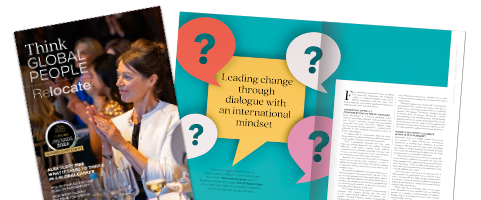

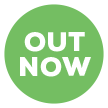 Magazine
Magazine